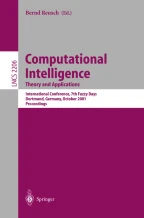Abstract
Humans have a remarkable capability to perform a wide variety of physical and mental tasks without any measurements and any computations. Familar examples are: parking a car, driving in city traffic, playing golf, cooking a meal, and summarizing a story. In performing such tasks, humans employ perceptions of time, direction, speed, shape, possibility, likelihood, truth, and other attributes of physical and mental objects. Reflecting the bounded ability of the human brain to resolve detail, perceptions are intrinsically imprecise. In more concrete terms, perceptions are f-granular, meaning that (a) the boundaries of perceived classes are unsharp; and (b) the values of attributes are granulated, with a granule being a clump of values (points, objects) drawn together by indistinguishability, similarity, proximity, and functionality. For example, the granules of age might be labeled very young, young, middle-age, old, very old, etc.
Research supported in part by ONR Contract N00014-99-C-0298, NASAContract NCC2-1006, NASA Grant NAC-117, ONR Grant N00014-96-1-0556, ONR Grant FDN0014991035, ARO Grant DAAH 04-961-0341 and the BISC Programm of UC Berkeley. Lotfi A. Zadeh is Professor in the Graduate School and director, Berkeley initiative in Soft Computing (BISC), Computer Science Division and the Electronics Research Laboratory, Department of EECs, University of California, Berkeley, CA 94720-1776; Telephone: 510-642-4959; Fax: 510-642-1712; email: zadeh@cs.berkeley.edu.
Access this chapter
Tax calculation will be finalised at checkout
Purchases are for personal use only
Similar content being viewed by others
Editor information
Editors and Affiliations
Rights and permissions
Copyright information
© 2001 Springer-Verlag Berlin Heidelberg
About this paper
Cite this paper
Zadeh, L.A. (2001). A New Direction in AI — Toward a Computational Theory of Perceptions. In: Reusch, B. (eds) Computational Intelligence. Theory and Applications. Fuzzy Days 2001. Lecture Notes in Computer Science, vol 2206. Springer, Berlin, Heidelberg. https://doi.org/10.1007/3-540-45493-4_63
Download citation
DOI: https://doi.org/10.1007/3-540-45493-4_63
Published:
Publisher Name: Springer, Berlin, Heidelberg
Print ISBN: 978-3-540-42732-2
Online ISBN: 978-3-540-45493-9
eBook Packages: Springer Book Archive
